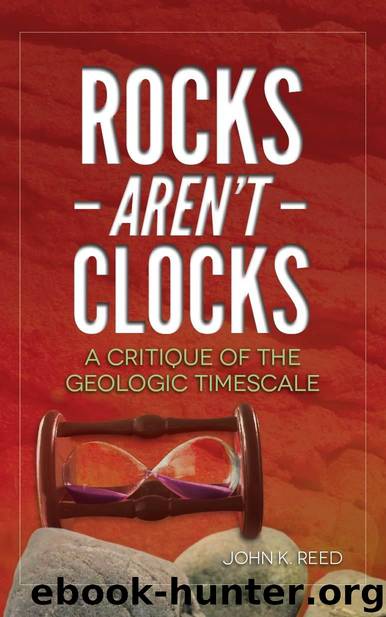Rocks Aren't Clocks: A Critique of the Geologic Timescale by John Reed

Author:John Reed
Language: eng
Format: mobi
Publisher: Creation Book Publishers
Published: 2014-10-01T16:00:00+00:00
Problem 3: The vanishing record
Another problem is one that geologists downplay to the public, because to examine it carefully would be like dumping a bucket of water on the Wicked Witch of the West:
… the geologic record is discontinuous, and these stratotype-based7 chronostratigraphic units are an imperfect record of the continuum of geologic time … .8
The public has been led to believe that the rock record is sufficiently whole for confident determinations to be made of Earth’s history, as encapsulated by the geologic timescale. However, the actual record is much more than an “imperfect record”, it is a vanishingly small record, in terms of the time actually preserved. There are vast volumes of rocks in Earth’s crust, but how much of our planet’s real history is captured by them? Early geologists, blinded by the light of uniformitarianism and deep time, were quick to ascribe equally vast volumes of time to specific series of rocks. But modern studies have shown that many rock bodies form quite rapidly. In other words, geologic time is composed of tangible physical evidence in rocks and their fossil contents, and of gaps of time undocumented by any actual artifact.
In recent decades, the gaps have grown. Observed sedimentation rates are quite high; those attributed to deep time are much smaller. Although Miall asserted that the ‘frozen accidents’ that comprise the rock record were in accord with a new understanding of uniformitarianism,9 the fact remains that stratigraphic incompleteness10 is a much larger problem than commonly discussed.
Geologists admit this imperfection in the rock record, but then move on.11 But we need to stop and examine it more carefully because it is a fatal problem, given the constraints of their worldview. Once again, logic rears its ugly head. Secular scientists have been telling the world for more than 200 years that they are objective, rational empiricists. They are all realists, while Christians are cast as credulous, simple folk, too scared or ignorant to question their faith. But in this instance, it appears that it is the scientists who walk by faith. If they were true empiricists, the absence of tangible evidence in the forms of gaps in the rock record would be a serious problem, each gap decreasing our knowledge of that particular time and thus of the past as a whole. With decreasing data would come decreasing certainty. Secular natural history demands an empirical description of the past, and even a credulous Christian might think there’s a problem if there are only a few shreds of evidence. You wouldn’t expect to learn algebra if the textbook only had two pages out of its original two hundred, and especially if those two were missing most of the text!
The new love affair with neocatastrophism rids geologists of the albatross of Lyell’s gradualism, but it exacerbates the problem of our grasp on the past. If existing rock units were deposited rapidly in shorter timespans, the ‘gaps’ in history are only getting bigger. New evidence is showing that much of the time represented by the rock and fossil records is questionable.
Download
This site does not store any files on its server. We only index and link to content provided by other sites. Please contact the content providers to delete copyright contents if any and email us, we'll remove relevant links or contents immediately.
Man-made Catastrophes and Risk Information Concealment by Dmitry Chernov & Didier Sornette(6005)
The Revenge of Geography: What the Map Tells Us About Coming Conflicts and the Battle Against Fate by Kaplan Robert D(4066)
Zero Waste Home by Bea Johnson(3833)
COSMOS by Carl Sagan(3617)
Good by S. Walden(3548)
In a Sunburned Country by Bill Bryson(3536)
The Fate of Rome: Climate, Disease, and the End of an Empire (The Princeton History of the Ancient World) by Kyle Harper(3055)
A Wilder Time by William E. Glassley(2858)
Camino Island by John Grisham(2794)
Organic Mushroom Farming and Mycoremediation by Tradd Cotter(2688)
The Ogre by Doug Scott(2679)
Human Dynamics Research in Smart and Connected Communities by Shih-Lung Shaw & Daniel Sui(2500)
Energy Myths and Realities by Vaclav Smil(2487)
The Traveler's Gift by Andy Andrews(2457)
9781803241661-PYTHON FOR ARCGIS PRO by Unknown(2365)
Inside the Middle East by Avi Melamed(2350)
Birds of New Guinea by Pratt Thane K.; Beehler Bruce M.; Anderton John C(2249)
A History of Warfare by John Keegan(2240)
And the Band Played On by Randy Shilts(2197)
